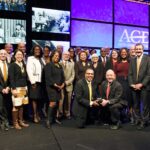
As he received one of higher education’s highest honors on Monday, March 12, UMBC President Freeman Hrabowski used the moment to underscore the essential role that colleges and universities play in society as centers of discourse where history is revered and where ideals are matched by service.
Hrabowski accepted the American Council on Education (ACE) Lifetime Achievement Award on behalf of the “wonderful colleagues and students” at UMBC. He is among the most highly regarded and longest-serving university leaders in the nation, having served as president of UMBC since 1992. He is widely celebrated for supporting student success across all fields and populations, and particularly for his work with fellow educators, research agencies, philanthropists, and other partners to make UMBC a national model for increasing diversity in STEM.
“Freeman is a fierce champion of the traditionally unseen and underserved, and he is a vigorous and powerful mentor,” said ACE president Ted Mitchell. “He has been called one of America’s best leaders, one of the 100 most influential people in the world, one of America’s best 10 college presidents…At ACE, we just call him our future.”
Before a crowd of hundreds of educators from across the country, Hrabowski talked about his childhood in 1950s Alabama, and his mother, an English teacher who taught him never to think of himself as “second rate” despite the lack of resources available in his segregated public school. A child leader in the Civil Rights Movement, Hrabowski was spat upon by Birmingham’s public safety commissioner, Eugene “Bull” Connor, during a demonstration, and then arrested.Hrabowski’s experiences in the Civil Rights Movement drove him to push boundaries and reach further in his own education, and to create new opportunities for students of the future. UMBC opened in 1966 as the first public university in Maryland to welcome students of all backgrounds. Since becoming the university’s leader 26 years ago, Hrabowski has worked with the campus community to create an environment that both challenges and nurtures the next generation of thinkers and leaders.
In the current moment of heightened political and social divisions, he noted, he is particularly proud of the willingness of students with varying backgrounds and perspectives to come together to discuss difficult issues. “The idea being that we will agree to disagree agreeably…to have civility, and before we answer, to breathe and reflect,” he said.
In 2008, Hrabowski was named one of America’s Best Leaders by U.S. News and World Report. In Hrabowski’s time as president of UMBC, the university has grown to prominence as one of the most innovative colleges nationwide, balancing commitments to teaching and research, and producing remarkable alumni, from artists and policy makers to teachers, scientists, and social workers, as well as the current surgeon general and, fittingly, university presidents.
Photo credit: Tim Trumble/ACE






